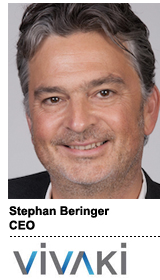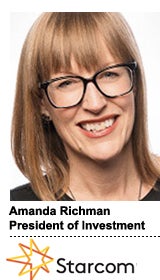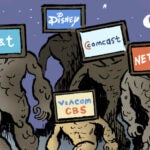 It’s been a year since Publicis Groupe forced a big transition of its programmatic operation that many saw as the future of data-driven agency services: It decentralized its seven-year-old trading desk, VivaKi AOD, and reassigned its employees to new jobs within the holding company’s media agencies.
It’s been a year since Publicis Groupe forced a big transition of its programmatic operation that many saw as the future of data-driven agency services: It decentralized its seven-year-old trading desk, VivaKi AOD, and reassigned its employees to new jobs within the holding company’s media agencies.
Today, its grand experiment is seriously strained by a loss of talent that has claimed more than 55% of those staffers, AdExchanger has learned.
Of the 90 or so in client services who were transferred to new homes at Starcom Mediavest Group (SMG), ZenithOptimedia (ZO) and Digitas, at least 50 have since left the company for new jobs outside the Publicis family. About 37 of them went to technology or media companies, including 10 who took jobs with longtime VivaKi partner Google.
More painfully, 13 went to competing agencies, including IPG’s Cadreon, WPP’s Team Detroit and Havas.
It’s a high level of attrition, even for the churn-heavy agency arena.
Sources give a variety of reasons for the departures, including morale issues and organizational missteps that kept SMG and ZO from absorbing the new headcount as intended.
Yet while those who spoke with AdExchanger professed shock at the extent to which Publicis’ programmatic brain trust has been depleted, few find fault with the decision to unwind VivaKi. And senior managers at VivaKi, SMG and ZO still describe the transition as a success.
“Of course there was attrition, but you won’t find a client who said it didn’t work or the service was bad,” said Stephan Beringer, CEO of VivaKi. “The contrary is the case.”
Sources both inside and outside the company talked to AdExchanger about what happened.
A Good Idea At The Time
 The move to fully embed VivaKi AOD’s capabilities within the Publicis media agencies, initiated in mid-2014, had a sound rationale.
The move to fully embed VivaKi AOD’s capabilities within the Publicis media agencies, initiated in mid-2014, had a sound rationale.
The acceleration of programmatic spend ($10 billion in the US for full-year 2014, according to the IAB) had created a clear need to empower traditional agency account teams with data-driven expertise.
Meanwhile, client “trust issues” with their agencies’ programmatic buying and billing practices had devolved to the point where many flatly refused to allow their agencies to buy from the sister trading desk units. Just last week, a survey from Forrester and the Association of National Advertisers found that while the number of marketers running programmatic buys had doubled in two years, more than half (55%) were worried about transparency in the supply chain – up dramatically from 21% two years ago.
Publicis was merely the first to internalize the writing that had been on the wall for some time: The trading desks had to go.
Most agree its heart, and its head, were in the right place.
“These were people with the most desirable, hard-to-find skills,” said one former staffer. “These were supposed to be the change agents.”
“I do believe they ultimately did the right thing,” said another source, a senior exec with an outside technology partner. “You can argue that they didn’t execute it well or you can argue they did it prematurely. But they did the right thing.”
Reasons For Leaving
The 50 or so people who left between fall 2014 and winter 2016 had different reasons for entertaining outside offers. Those reasons included culture issues and morale problems that are the natural risk of relocating any employee.
But other damage was self-inflicted by VivaKi and its peer agencies, the result of what some people characterize as poor preparation by the holding company’s leadership and its agency finance groups.
For instance, in some cases finance leaders at the media agencies could not account for all of the newly transferred VivaKi employees using the traditional method of agency compensation, which is based on a fixed number of full-time employees. Therefore, some senior managers at the agencies refused to accept all the new employees they were expected to.
Not only did this leave some VivaKi staffers with no place to go, but it also created a morale problem for colleagues freshly arrived at the operating agencies that were suddenly short-handed.
“That was a big mistake on VivaKi’s part, breaking it up too early [and] losing programmatic buying best practices,” said Megan Pagliuca, CEO of Omnicom trading desk Accuen, speaking on a panel at AdExchanger’s Industry Preview conference in January.
A second problem was tension between team members. Back when VivaKi was a sealed-off unit, some media agency staff resented the perceived requirement that they place programmatic media spend with the trading desk. Now VivaKi employees were forced to work side by side with those same individuals, leading to some harsh vibes.
“Imagine you’re the head of ZenithOptimedia and you’ve just found out they’re blowing up VivaKi,” said a source with knowledge of the internal dynamics at the companies. “The same people who forced you to give money to them, the ones who were taking money out of your mouth, now they’re going to be on your team.”
That interpersonal tension led some senior VivaKi people to leave, while junior people were “left to fend for themselves,” according to one person close to the transition. “Some of them got their start at the agency and realized how brutal it was,” before disembarking for new, readily available jobs at companies like Centro, Twitter and Facebook.
A small number of people have boomeranged back to Publicis. Bryan Nagy, a VivaKi AOD staffer assigned to DigitasLBi only to leave for a job with Dentsu trading desk AMNET, returned to Spark SMG just last month. Another, Robert Gibbs, returned to SMG as global digital director after a stint at Mediaocean.
But most who left stayed gone.
“It just wasn’t the right time or the right leadership who could appreciate and take the care necessary to leverage those people,” another source said.
Glass Half-Full
Beringer, the VivaKi CEO who still oversees an organization with some 400 people (more on that below), strongly disagreed with the above characterization.
“I’ve rarely seen so much communication or collaboration,” he tells AdExchanger. “We are working together across all the disciplines. All the data models we’re developing, we’re developing them for the whole of Publicis Groupe.”
Beringer insists there was never an explicit mandate for operating agencies to keep their programmatic buys with VivaKi, and he said the attrition Publicis agencies experienced after the transition was not dramatically higher than what any other agency programmatic unit sees in the course of an 18-month period.
“When you change a model, you have incremental challenges. For this challenge we’ve made it work incredibly well,” he said. “And that’s because everyone from all sides was extremely committed to making it work. Everybody else will follow. Our world is becoming programmatic overall.”
To emphasize the change management challenge, Beringer pointed to the immensity of Publicis’ media buying organization. “You have to keep in mind that we have four networks: Zenith, Optimedia, Starcom and Mediavest. We had four big shifts.” By contrast, Omnicom Group has two: PHD and OMD. (Though it is soon to add a third, to staff up the P&G business it won from Starcom.)
Beringer cites a cross-agency data architecture effort led by Razorfish CTO Ray Velez and DigitasLBi CTO Paolo Yuvienko. He also noted that Publicis remains a key partner for the cloud marketing and CRM platforms run by Adobe, Salesforce and Microsoft.
“I think we have the broadest and deepest programmatic offering in the market,” he said. “We’re not just white-labeling something. We have the strongest internal technology capability,” a reference in part to RUN, the demand-side platform Publicis acquired in 2014 and which has been staffing up of late.
What about Publicis’ major account losses of recent months? Aside from P&G, its agencies have lost some or all of its US media business with Coca-Cola and Walmart. P&G landed at Omnicom Group, which said digital strategy was a big reason for the win.
“I don’t think any client losses were due to programmatic,” said Beringer.
The SMG Perspective
 “From a Starcom point of view, it’s been a very positive story,” said Amanda Richman, president of investment and activation at Starcom. “We’ve been able to deliver on the promise of the integration, which is to accelerate the agency’s expertise when it comes to programmatic and data.”
“From a Starcom point of view, it’s been a very positive story,” said Amanda Richman, president of investment and activation at Starcom. “We’ve been able to deliver on the promise of the integration, which is to accelerate the agency’s expertise when it comes to programmatic and data.”
According to Richman, the inbound staffers from VivaKi have jumpstarted the agency’s ability to buy programmatically across multiple client teams. “We are working hand in hand with the [former VivaKi] planners and strategists. They are able to influence how we think about audience and planning,” she said.
She added that VivaKi people have gained proficiency outside the programmatic buying arena, by virtue of sitting within account teams that also house video buyers, TV buyers and print buyers – and some have moved into roles that touch on search, social and even insertion order-based buying.
“It opens up career paths that might not have been available to them if they had been a dedicated unit,” she said.
Not all Publicis agencies have leveraged their new VivaKi employees in the same way. Whereas at Starcom these experts are fully embedded on account teams, Zenith has a dedicated programmatic team of about 17, each of whom is dedicated to two or three accounts.
“For ZenithOptimedia, our goal was to bring the programmatic experts closer to strategy and our media activation groups,” said Colin Kurth, VP of Audience Solutions Group at Zenith. “That approach focuses on the universal education of programmatic in the agency and how important that is for the future of the agencies practice.”
Publicis executives aren’t the only ones pleased with the transition. Technology partners generally prefer to work with operating agencies, rather than strictly through trading desks. If nothing else, it means they can sign more contracts.
In the wake of the centralization, some of its DSP partners have cut new deals with SMG and ZO directly, even as they maintain contracts with VivaKi.
“We often see partnerships with the brand, the agency and ourselves,” said Turn CEO Bruce Falck, in a recent AdExchanger interview. “I suppose it’s more true of VivaKi … where they decentralized off of AOD and the programmatic expertise lives at the agency level. We have great partnerships when that happens.”
“With programmatic, one of the most beautiful things is insights,” said a senior executive at another DSP, who asked not to be identified. “At the end state, those insights have to be in the agencies that are interacting directly with the brand.”
What’s Left
Despite the decentralization, VivaKi still employs 400 people globally, with around 200 in the US. These folks are spread across several units, including VivaKi Exchange (VX), VivaKi Operating System (VOS) and RUN, which used to be part of Starcom but is now “aligned with VivaKi” in the words of an AOD spokesperson. VOS still has a strong core team that develops products and solutions, such as VivaKi Verified, Quality Index and analytics tools.
Three or four people remained in the core programmatic client services arm – the part that used to be called AOD – following the transition. Beringer calls these individuals a “kernel resource.”
The attrition at SMG, ZO and Digitas has resulted in a certain amount of “overflow” work that VivaKi is trying to address with a continued central staff.
As a result, VivaKi has added some staff to deal with overflow client services work. A group of three campaign managers in a so-called Media Operations group has grown to about nine. These are VivaKi-funded resources tasked with absorbing the planning and optimization of campaigns. Two sources have characterized this effort as a return to centralized services, although a spokesperson flatly denies that VivaKi is recreating a hub buying operation.
VivaKi also has embarked on a training and education initiative designed to bring programmatic knowledge to Publicis employees. The program offers 28 courses, which will culminate in programmatic certification exams taken by employees of 18 agencies spanning not only media services but also digital and creative shops. More than 2,000 courses have been completed, the company says.
Publicis is determined that its people will get programmatic religion, hell or high water.
While VivaKi’s decentralization may go down as more of a cautionary tale than a leap forward, it’s still an example that most holding company competitors will be forced to follow.
“Stephan has a very difficult job,” said the DSP executive cited above. “He’s now a diplomat. He’s secretary of state trying to make peace with the rest of the Publicis world, but with programmatic excellence and the blessing of Maurice Levy and the understanding that they need to have more of a resource.”
Updated with comment from Zenith.














